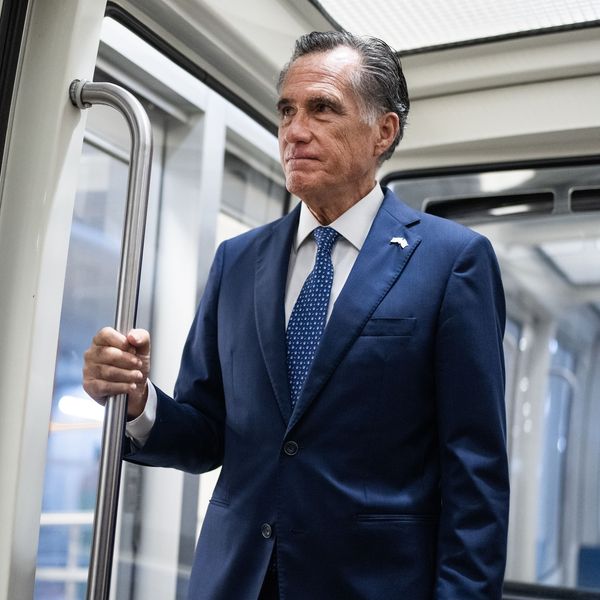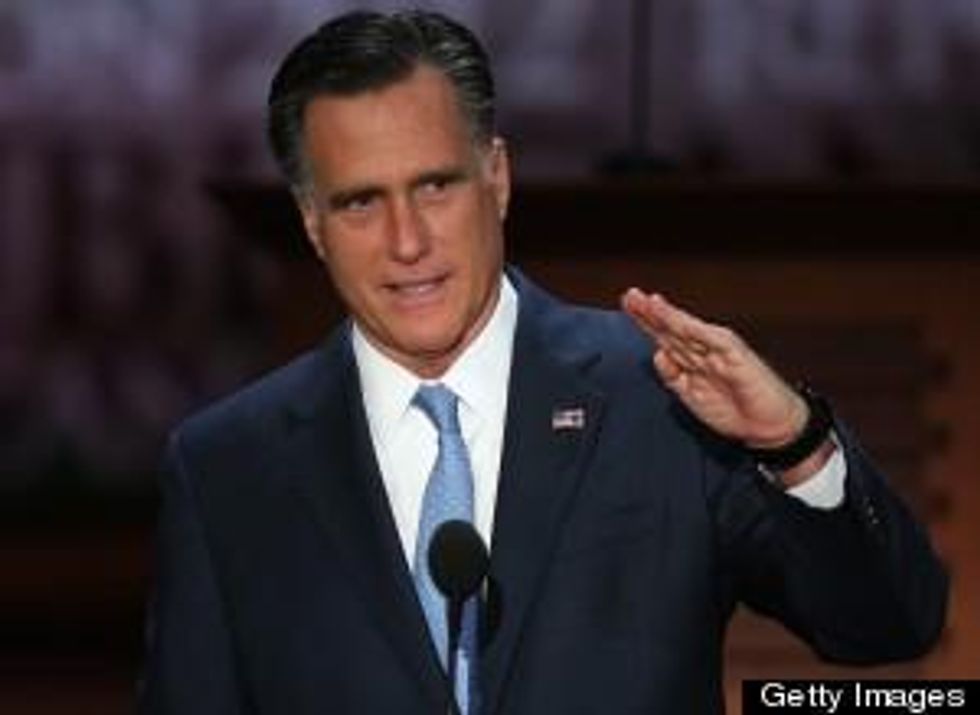Who knew that Mitt Romney was such a fan of Barack Obama's 2008 campaign?
"How many days have you woken up feeling that something really special was happening in America?" Romney told thousands of Republican delegates, alternates and hangers-on Thursday night. "Many of you felt that way on Election Day four years ago. Hope and Change had a powerful appeal."
Speaking of the "fresh excitement about the possibilities of a new president" Americans felt upon Obama's election, the man who will now seek to prevent the Democratic president's reelection told the 40th Republican National Convention about how much he had hoped Obama would succeed "because I wanted America to succeed."
But it wasn't just that citizens wanted America to succeed. As Romney noted: "Every family in America wanted this to be a time when they could get ahead a little more, put aside a little more for college, do more for their elderly mom who's living alone now or give a little more to their church or charity... This was the hope and change America voted for."
In this, Romney was right.
When Americans went to the polls in 2008, the clear majority voted for Barack Obama because they wanted a president who would address the economic missteps and misdeeds that had caused a stock market meltdown on the eve of the election -- handing the new president what even one of his harshest critics, Republican vice president nominee Paul Ryan, admitted in his Wednesday night acceptance speech was "a crisis."
The response to that crisis, Americans hoped, would do more than just bring a measure of stability to the markets. They hoped that it would bring a measure of prosperity to them and to their communities.
Unfortunately, Obama and his party did not have partners in addressing the crisis.
While Romney says he wanted Obama to succeed, Rush Limbaugh said before the new president was inaugurated in January, 2009, "I hope Obama fails." Senate Republican Leader Mitch McConnell, R-Kentucky, said on behalf of the president's legislative partners: "The single most important thing we want to achieve is for President Obama to be a one-term president."
Paul Ryan saw to it: rallying opposition to a stimulus that was designed to jumpstart the economy, opposing health-care reforms that mirrored those Romney implemented as the governor of Massachusetts, and refusing even the most minimal compromises as the nation's credit-rating was threatened during a absurd fight over whether to raise borrowing limits that Democratic and Republican presidents had raised in the past.
Even in the rare instances where Obama put the needs of the nation -- and the moment -- above politics, other members of "the loyal opposition" merely opposed. One of them even argued against providing the support that was needed to preserve the American auto industry, writing an article that declared: "Let Detroit Go Bankrupt."
Who was that guy?
Oh, right, Mitt Romney.
Much was made of the web of deception that Paul Ryan wove with his acceptance speech on Wednesday night,. But Romney actually tried to one-up his running-mate.
The man who stood before the convention of his party and declared that he wanted Barack Obama to succeed campaigned against Obama's election in 2008 -- attacking the Democratic nominee and his supporters for proposing "timid, liberal empty gestures."
Throughout Obama's first-term, Romney was a steady critic -- not just of auto bailouts but of virtually all of the policies of the new administration. He never demanded, as Wendell Willkie did after the 1940 elections, that Republicans recognize the necessity of working with a Democratic president. Like Ryan, Romney abandoned the traditional "one nation" Republicanism of Dwight Eisenhower and a former Michigan governor named George Romney, which argued that Republicans could and should work with Democrats, especially in tough times.
On a night that was all about telling Mitt Romney's story, with reflections on his humane service with his church, on his not so humane service with Bain Capital and of his moderate Republican service as governor of Massachusetts (well, except for the Romneycare part), Romney and his enthusiasts had plenty to say about Obama's failings. Even in speeches that were ostensibly about Romney's business acumen, there were sharp, at times unrelenting "they just don't get it" attacks on the president.
Then, Romney went for the jugular with lines like: "President Obama promised to slow the rise of the oceans and to heal the planet. My promise is to help you and your family."
Applause.
"To the majority of Americans who now believe that the future will not be better than the past," he told a crowd filled , 'I can guarantee you this: if Barack Obama is re-elected, you will be right.'"
Thunderous applause.
That just does not sound like a guy who wanted Barack Obama to succeed.
It sounds more like a guy who formed part of a partisan opposition that did everything in its power to make Obama "a one-term president."
Three years into the first Obama term, veteran Washington watchers Thomas Mann (who works for a think tank packed with former Republican White House aides) and Norman Ornstein (who works for Dick Cheney's old think tank) wrote an article titled: "Let's just say it: The Republicans are the problem."
"We have been studying Washington politics and Congress for more than 40 years, and never have we seen them this dysfunctional. In our past writings, we have criticized both parties when we believed it was warranted. Today, however, we have no choice but to acknowledge that the core of the problem lies with the Republican Party," observed Mann and Ornstein.
"The GOP has become an insurgent outlier in American politics. It is ideologically extreme; scornful of compromise; unmoved by conventional understanding of facts, evidence and science; and dismissive of the legitimacy of its political opposition," they continued. "When one party moves this far from the mainstream, it makes it nearly impossible for the political system to deal constructively with the country's challenges."
The Republican Party of Teddy Roosevelt and Wendell Willkie, of Dwight Eisenhower and George Romney, of Gerald Ford, and, yes, of Ronald Reagan, never moved so far from the mainstream that it would not cooperate and compromise when it came time to do right by America.
But the party that Mitt Romney now leads moved so far that it was, indeed, "nearly impossible for the political system to deal constructively with the country's challenges."
They did not achieve Limbaugh's dream of forcing an Obama failure. But they made the president's tenure dramatically harder, and the prospect for renewal dramatically more difficult to achieve. And, now, Mitt Romney says: "Today the time has come for us to put the disappointments of the last four years behind us. To put aside the divisiveness and the recriminations. To forget about what might have been and to look ahead to what can be."
Or, it could be a time to consider the successes that might have been if the party that has nominated Mitt Romney for president and Paul Romney for vice president was not "an insurgent outlier in American politics. (that was) ideologically extreme; scornful of compromise; unmoved by conventional understanding of facts, evidence and science."
"You might have asked yourself over these last years whether this is the America we want," Romney said in his acceptance speech.
Yes, Americans might have asked just that.


